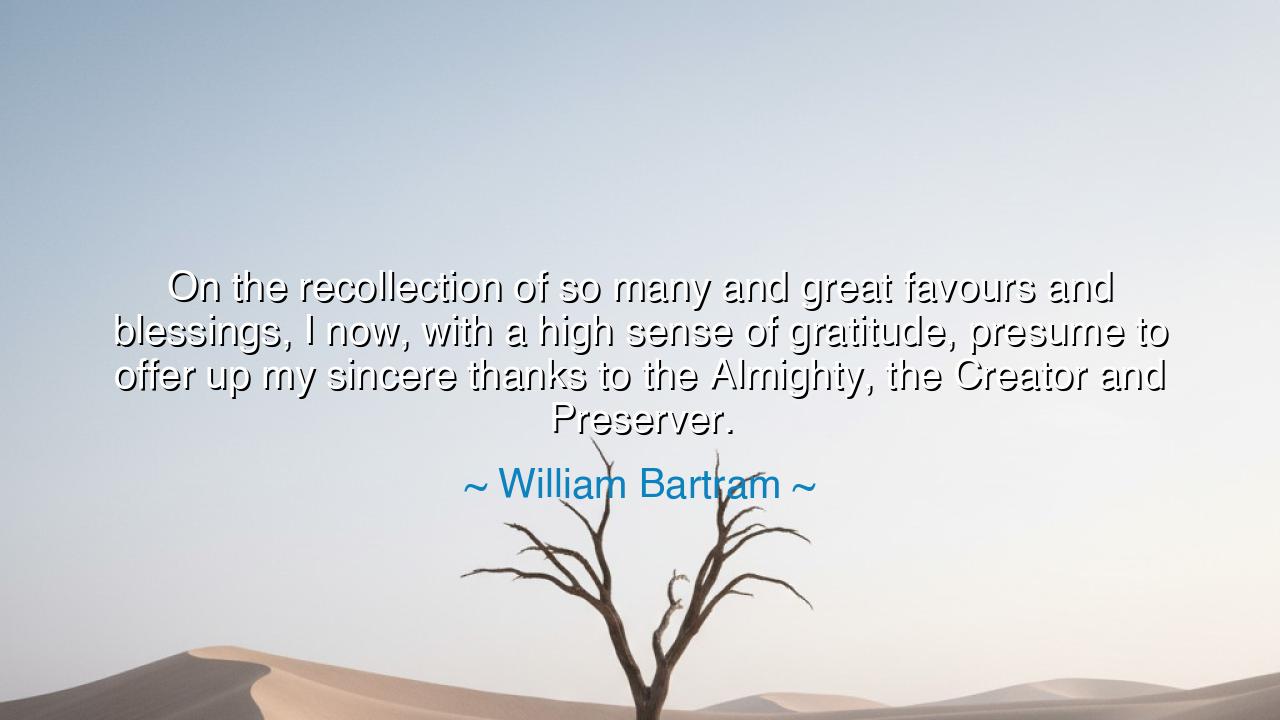
On the recollection of so many and great favours and blessings, I
On the recollection of so many and great favours and blessings, I now, with a high sense of gratitude, presume to offer up my sincere thanks to the Almighty, the Creator and Preserver.






“On the recollection of so many and great favours and blessings, I now, with a high sense of gratitude, presume to offer up my sincere thanks to the Almighty, the Creator and Preserver.”
Thus spoke William Bartram, the naturalist, explorer, and poet of the wilderness, whose eyes beheld the divine handwriting upon the face of nature. In these reverent words, drawn from his travels through the wilds of early America, Bartram pours forth not only thanksgiving but a vision of man’s place within creation. He does not speak as a conqueror of the land, but as a witness of wonder, a soul humbled by the majesty of life. His words carry the tone of one who, having journeyed far through peril and beauty alike, pauses to acknowledge that all he has seen and survived comes from a higher hand — the Almighty, the Creator and Preserver.
Bartram’s life was one of curiosity and courage. Born in 1739, he was among the first to explore and document the vast American South — its rivers, forests, and flowers — when much of it was still untamed. His book, Travels through North and South Carolina, Georgia, East and West Florida, stands as both a scientific record and a hymn to the living world. He saw in every leaf and bird a reflection of divine order, and his heart overflowed with gratitude. Thus, this quote emerges not from comfort or ease, but from the wilderness itself — from a man who, surrounded by storms and serpents, hunger and solitude, yet found within all things the quiet pulse of providence. His “high sense of gratitude” was no passing sentiment; it was the harvest of awe.
To recollect one’s blessings is to awaken the soul to its true wealth. Bartram’s words remind us that gratitude is not born from abundance, but from awareness. He speaks of “so many and great favours and blessings,” not because his life was free of hardship, but because he saw grace even in difficulty. He recognized that to live, to see, to understand, is itself a divine favor. The ancient poets of every nation have sung the same: that thanksgiving is the highest prayer, for it transforms perception. To give thanks is to see the sacred in the ordinary, to perceive the Creator and Preserver behind the fragile veil of creation.
The spirit of Bartram’s gratitude echoes that of other explorers of faith and wonder. Consider Lewis and Clark, who, after years of hardship crossing an unknown continent, paused by the Pacific Ocean to give thanks not for victory, but for survival — for guidance, for endurance, for the mercy that had brought them through. Or think of Helen Keller, who, though deprived of sight and sound, spoke often of her thankfulness for life itself, saying that gratitude “turns denial into acceptance, chaos into order, confusion into clarity.” Such souls knew, as Bartram did, that gratitude is the light that reveals meaning in both joy and suffering.
Bartram’s invocation of the Almighty as both Creator and Preserver carries deep wisdom. To see God as Creator is to honor the beginning of all things — to recognize the source. To see God as Preserver is to acknowledge the ongoing care that sustains the world. The flowers he studied, the rivers he traced, the beasts he admired — all were part of that divine preservation, each moment an act of renewal. In this way, his gratitude was not backward-looking only; it was a living prayer, a recognition that existence itself is sustained by love.
The lesson of Bartram’s words, then, is simple yet profound: to live with gratitude is to live in harmony with the divine. In every age, men chase wealth, fame, and conquest, believing such things will fill the heart. But the truly wise — like Bartram — pause to remember that life’s true treasures are not gained, but given. Gratitude transforms hardship into wisdom, fear into faith, and the fleeting into the eternal. It is the soul’s way of saying, “I see the hand that guides me, and I am thankful.”
So, my child of earth and wind, learn from William Bartram. Take time to recollect your blessings — not only those that dazzle, but those that sustain. Give thanks for breath, for friendship, for the beauty that still graces the world despite its sorrows. Offer your gratitude not as an empty ritual, but as a living flame, rising from the heart to the heavens. For as Bartram knew in the stillness of the wilderness, when one’s soul is filled with thanksgiving, even the humblest life becomes rich — and every path, however wild or uncertain, becomes a pilgrimage toward the Creator and Preserver.






AAdministratorAdministrator
Welcome, honored guests. Please leave a comment, we will respond soon